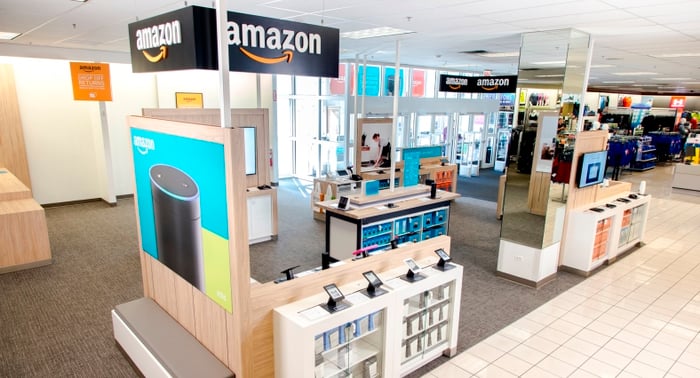On Thursday morning, Kohl's (KSS 1.49%) reported stellar sales and earnings results for the final quarter of fiscal 2017. Investors already knew to expect great things, after Kohl's increased its guidance significantly in early January. However, the company managed to beat even its upgraded forecast.
Nevertheless, investors weren't impressed -- or at least they weren't impressed enough. Kohl's stock rallied more than 25% in the first few weeks of 2018, reaching a new multiyear high of nearly $70. Yet the stock fell 5% on Thursday following Kohl's earnings report, leaving it about 10% below its 52-week high. This looks like an attractive buying opportunity for long-term investors.
Kohl's Stock Performance. Data by YCharts.
Kohl's knocks it out of the park
During the November-December holiday period, Kohl's achieved a stellar 6.9% increase in comparable-store sales. This gave management the confidence to raise its full-year earnings per share guidance to $4.10-$4.20, up from $3.72-$3.92 previously.
Comp sales growth slowed modestly in January, but still beat management's expectations. The net result was that comp sales rose 6.3% for the fourth quarter as a whole. Adjusted EPS reached $1.99 for the quarter and $4.31 for the full year. Even excluding an $0.08-per-share benefit from the reduced corporate tax rate, Kohl's exceeded the high end of its updated guidance range from January.
Free cash flow totaled $881 million in fiscal 2017. While that was down 30% year over year, Kohl's had posted extremely strong cash flow in fiscal 2016, driven by an unsustainable level of working capital improvement. Notably, free cash flow per share remained well ahead of adjusted EPS, at approximately $5.24.

Kohl's continues to generate strong free cash flow. Image source: Kohl's.
Are investors worried about the outlook?
One potential reason for the pullback in Kohl's stock is that investors were disappointed by the company's Q1 forecast. CFO Bruce Besanko projected that operating expenses will increase at a mid-single-digit rate this quarter, which would exceed the company's projected sales growth. The resulting EPS forecast of $0.45-$0.50 fell short of the average analyst estimate of $0.55.
However, if this caused Kohl's stock's rough Thursday performance, it reflects very shortsighted thinking by investors. Much of the Q1 expense growth seems to relate to the timing of investments. Kohl's guidance implies that year-over-year expense growth will fall to a low-single-digit level for the remainder of fiscal 2018.
Indeed, for the full year, Kohl's expects EPS to surge to $4.95-$5.45, thanks again to the benefit of tax reform. That's well ahead of the average analyst estimate of $4.72. Furthermore, free cash flow is likely to surpass $1 billion (or $6 per share) again.
Are investors unsure about Kohl's partnerships?
Another potential reason for the dip in Kohl's stock on Thursday is that investors were hoping for more news about Kohl's partnerships with Amazon.com (AMZN -2.56%) and Aldi. In late 2017, Kohl's began accepting returns of Amazon merchandise at more than 80 pilot stores in the Los Angeles and Chicago metro areas. (It also opened Amazon smart home shops in 10 of these locations.)
For Kohl's, the primary goal of the Amazon partnership is to boost its store traffic. Management seems happy with this pilot so far. Furthermore, Kohl's has had preliminary discussions with Amazon about potentially expanding the relationship to more stores. However, Kohl's CEO Kevin Mansell stated during the earnings call that it was too early to provide any further details.

Kohl's opened Amazon smart home shops in 10 of its stores last fall. Image source: Kohl's.
It's also possible that investors were underwhelmed by a new partnership with discount grocer Aldi announced on Thursday. Aldi will open up to 10 stores this year in space being vacated by Kohl's stores that are downsizing.
Having a high-traffic grocery store next door should boost foot traffic at these Kohl's locations, in addition to creating a new source of rental income. Investors may have been hoping for a faster rollout, though, as Kohl's has hundreds of stores that are potentially suitable for downsizing.
The stock sell-off doesn't make sense
Kohl's is entering 2018 with more momentum than it has had at any point in the past decade. Additionally, the company has a solid pipeline of initiatives to drive further sales and earnings growth, of which the Aldi pilot is arguably the most promising.
That's why the recent pullback in Kohl's stock looks like a buying opportunity. With free cash flow per share likely to exceed $6 this year -- and plenty of room for future growth -- the stock's Thursday closing price of $62.75 seems too low. Furthermore, Kohl's generous 3.9% dividend yield ensures that patient shareholders will be well-compensated while they wait for the stock to regain its momentum.




